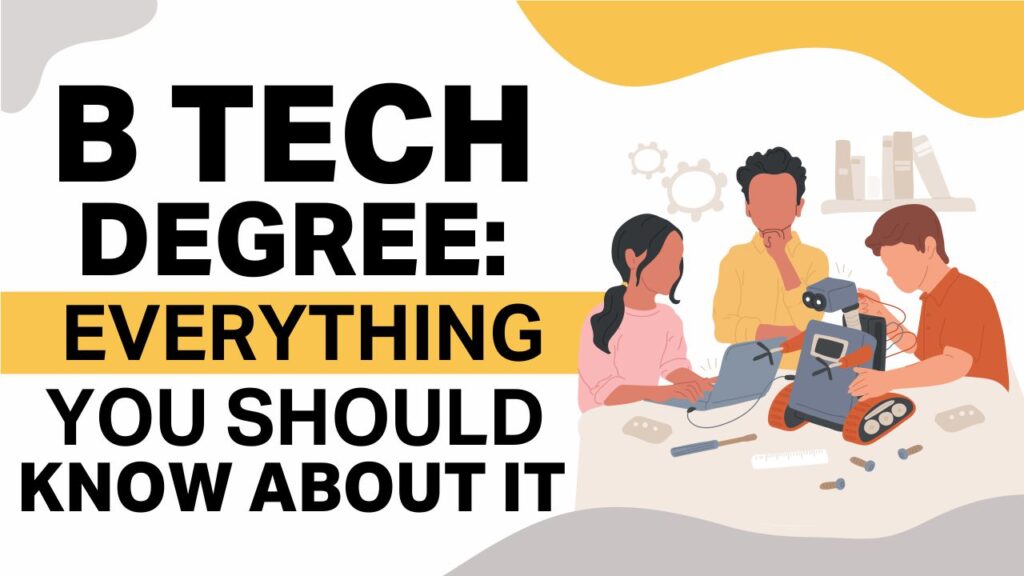Physical Address
304 North Cardinal St.
Dorchester Center, MA 02124
Physical Address
304 North Cardinal St.
Dorchester Center, MA 02124

Embarking on a journey into higher education is a significant step, and choosing the right degree can shape your entire career. For those with a passion for innovation, problem-solving, and the practical application of scientific principles, the Bachelor of Technology (B.Tech) degree is a prominent and popular choice. This comprehensive guide will walk you through everything you need to know about this dynamic field of study.
We will explore what a B.Tech degree entails, its duration, the career paths it unlocks, and how it stands as a cornerstone of modern industry. Whether you’re a high school student planning your future or someone considering a career shift, this article will provide clear and valuable information about the B.Tech course.
A Bachelor of Technology, commonly known by its short form B.Tech, is a professional undergraduate engineering degree program. It focuses on the practical and skill-oriented aspects of engineering and technology. Unlike more theoretical science degrees, a B.Tech curriculum is designed to equip students with hands-on skills and technical knowledge that are directly applicable in the industry. The core idea is to bridge the gap between scientific theory and real-world application.
Many people wonder about the full form of B.Tech. It simply stands for Bachelor of Technology. This degree is recognized globally and serves as a primary qualification for individuals seeking to work as engineers. A B.Tech student is trained not just to understand concepts but to build, design, implement, and manage technological solutions.

A common point of confusion is whether a B.Tech is an undergraduate or graduate qualification. To be clear, a B.Tech is an undergraduate degree. This means it is the first level of university education you pursue after completing high school (or its equivalent, like 10+2). So, is B.Tech UG or PG? It is definitively a UG (undergraduate) course. Upon completion, a student is considered a B.Tech graduate, which is equivalent to having a bachelor’s degree. This qualification makes you a graduate, but the degree itself is at the undergraduate level.
So, how many years is a B.Tech program? The standard B.Tech course duration is four years. This period is typically divided into eight semesters, with each academic year comprising two semesters. This structured timeline allows for a deep and progressive dive into the chosen field of engineering.
The curriculum in the first year is generally common for all engineering students, regardless of their specialization. It covers foundational subjects like physics, chemistry, mathematics, and an introduction to engineering concepts and programming. This ensures every B.Tech student has a solid multidisciplinary base.
From the second year onwards, the coursework becomes more specialized. Students delve into core subjects related to their chosen branch of engineering, such as Civil, Mechanical, Computer Science, or Electrical Engineering. The curriculum is a blend of classroom lectures, laboratory work, projects, and often includes internships or industrial training to provide practical exposure.
The B.Tech engineering umbrella covers a vast array of specializations, each catering to different facets of technology and industry. Choosing a specialization is a critical decision for a B.Tech student, as it will heavily influence their career path. Some of the most popular branches include:
The primary use of a B.Tech degree is to prepare individuals for a successful career in engineering and technology. The program’s practical focus ensures that graduates are not just theorists but capable doers. The skills learned are immediately valuable in the job market.
Here are some key uses and benefits of pursuing a B.Tech:
Completing a four year B.Tech program marks the beginning of a professional journey. A B.Tech graduate has several exciting paths to consider.

The most common path is to enter the workforce. Campus placements are a significant feature of most reputable engineering colleges, where companies visit to recruit students in their final year. Graduates can find roles as software developers, mechanical engineers, civil engineers, data analysts, system engineers, and more, depending on their specialization.
Many graduates choose to deepen their expertise through further education.
The problem solving skills and technical expertise gained during a B.Tech course make graduates well suited for entrepreneurship. Many successful startups have been founded by engineers who identified a problem and used their skills to build a technological solution.
The Bachelor of Technology is more than just a degree; it’s a gateway to a career built on innovation, logic, and practical application. It is a demanding but incredibly rewarding four-year undergraduate program that equips you with the skills to build the future. From understanding the core principles of science to designing and implementing cutting-edge technology, a B.Tech education prepares you for a dynamic and impactful career.
If you are a curious, analytical thinker who enjoys solving problems and wants to be at the forefront of technological advancement, a B.Tech degree could be the perfect choice for you. It offers a clear path to becoming a professional engineer, with diverse opportunities for growth, learning, and making a tangible difference in the world.